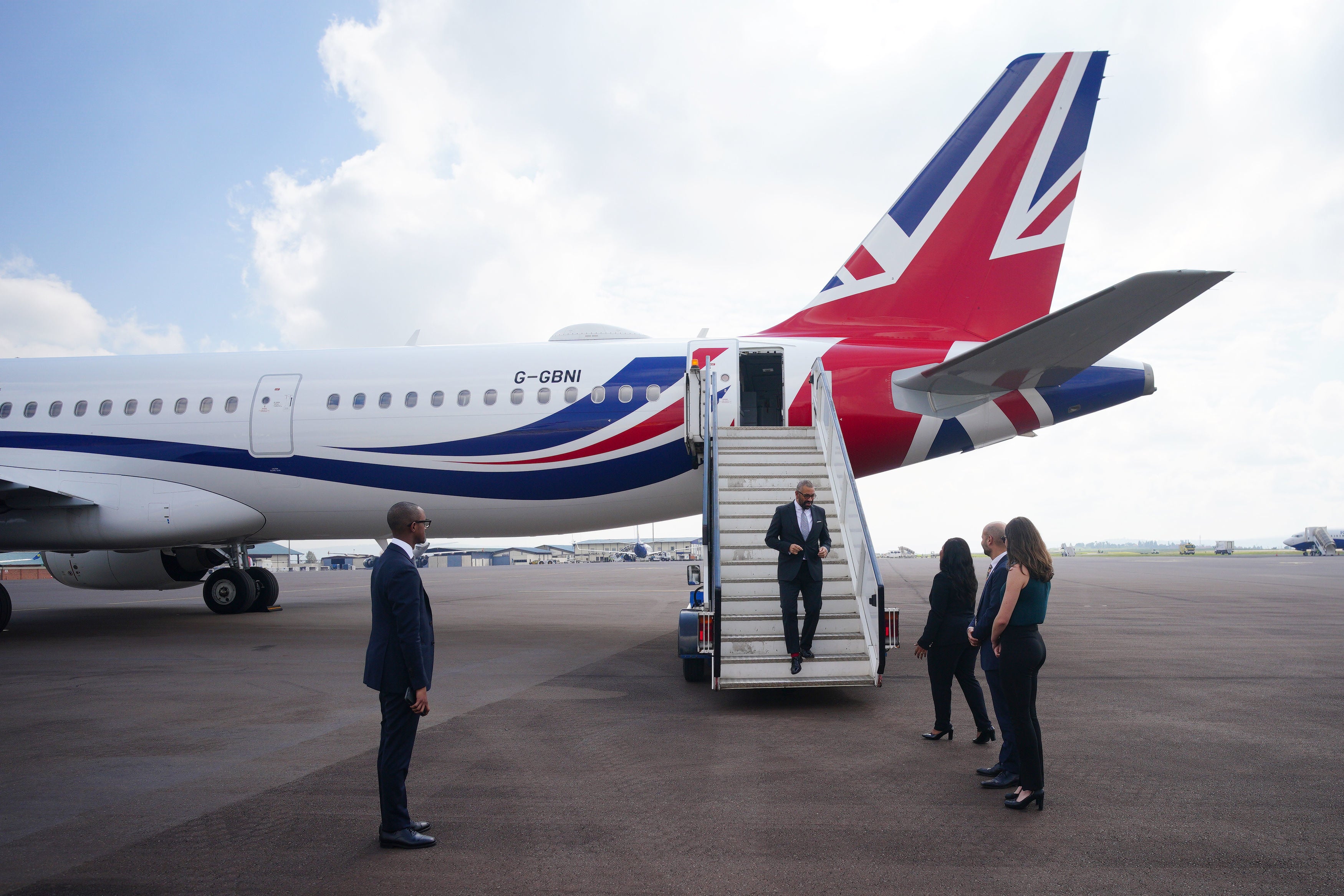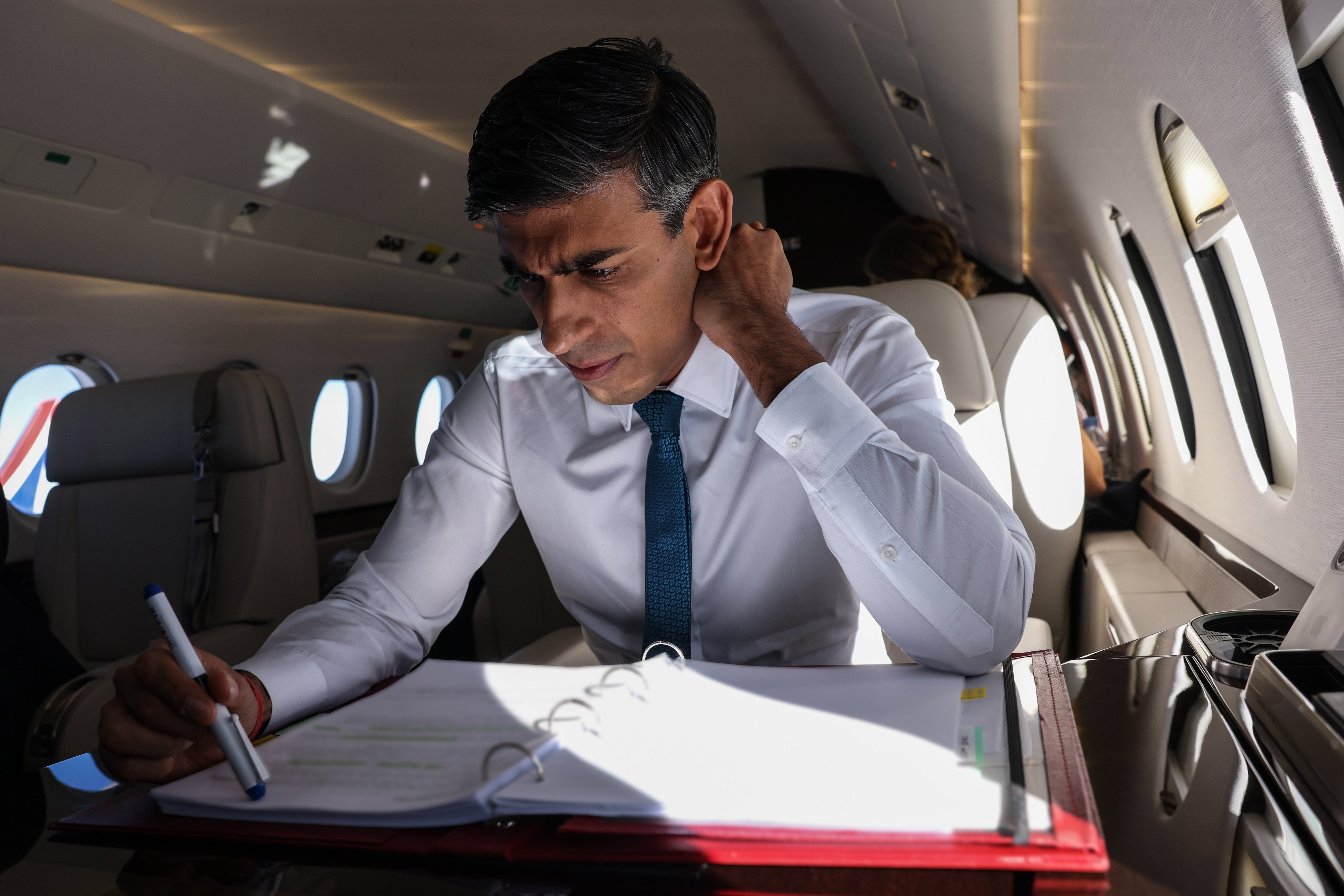Are politicians ever justified in using private jets?
As charges of hypocrisy fly over the cost of James Cleverly’s trip to Rwanda, Sean O’Grady asks if public figures should be allowed a little privilege in their transport arrangements – or whether it’s more politically astute to join the rest of us in the cheap seats


The home secretary, James Cleverly, spent some £165,561 last year chartering a private jet for a one-day round trip to Rwanda to sign a fresh treaty that would, supposedly, negate the UK Supreme Court’s finding of fact that Rwanda is not a safe third country for the deportation of refugees. The sudden urgent demand for new assurances about human rights from the Rwandans was, it is fair to say, politically driven, as the prime minister sees the Rwanda plan as the key “deterrent” in his struggle to “stop the boats” full of asylum seekers crossing the English Channel.
The revelation is troublesome because it reinforces the charge that this is a government with a profligate attitude to taxpayers’ money; that its ministers enjoy indulging themselves; and that the Rwanda scheme is, as Cleverly once repeatedly remarked in probate, a “bats***” crazy waste of money. Chartering a private jet is also, if anyone still cares, one of the most environmentally destructive ways to travel by air. Politically, the turbulence generated by such trips can be extremely distressing...
What’s the problem?
One of the most powerful charges that the media can throw at a serving politician – only a couple of steps down from conspiracy to murder (and that has happened) – is “hypocrisy”. Any minister who spends their time lecturing anyone who will listen about waste and extravagance in government, and then gets caught using a private jet, may expect some unsympathetic coverage.
Cleverly may claim that his trip was within the rules, and that it was a diplomatic breakthrough that will serve the country well for decades to come, but the impression is that he couldn’t wait a few days to take a scheduled flight to Kigali. Besides which, the Labour opposition – if, as is almost certain, it forms the next government – will cancel the entire Rwanda plan, quite possibly before a single flight has taken off.
Labour’s shadow minister for immigration, Stephen Kinnock, made the most of it: “Having clearly decided that committing £600m of taxpayers’ money to the Rwandan government for just 300 refugees wasn’t insulting enough, the home secretary decided to blow £165,000 on a flight to sign off on the hare-brained scheme. This government’s enthusiasm for wasting taxpayers’ money knows no bounds.”
Is the Sunak administration becoming a bit addicted to the jet-set lifestyle?
It does seem that way, and Rishi Sunak’s preference for the use of an expensive helicopter, rather than a train or a car, for even short hops within the UK has become a little notorious – a wealthy man, in range of becoming a billionaire, he seemingly has a sense of entitlement, too, and it makes him look increasingly out of touch. Unabashed, he claims that it is the best use of his valuable time, which is a fair point but also suggests a lack of political finesse.
How expensive is it?
In the context of total public spending of about £1 trillion, ie £1,000bn, the total cost of non-scheduled flights for all secretaries of state and prime ministers of almost £5m in 2022-23 is minuscule – but that’s beside the point; as Labour says, and the public is inclined to believe, ministers are taking too many non-scheduled flights at “extortionate cost”.
Does it matter politically?
Yes, and this impression of hypocrisy is damaging. Sunak has certainly presented the austere shadow chancellor with plenty of ammunition. Rachel Reeves, who gives the impression that she’d rather walk than shell out the people’s money on a two-quid bus ride, has attacked Sunak’s “private jet habit”, and says Labour would enforce ministerial rules on the use of private aircraft for official trips, saving “millions of pounds for taxpayers”.
Is it fair?
Yes and no. Certainly a helicopter saves time, and a prime minister is always busy. The taxpayer doesn’t fund his private travel, nor that which is clearly Conservative Party business, as the unfortunate revelations about Tory donor Frank Hester subbing £15,000 for the PM’s chopper rides prove. Sunak accepted more than £70,000 worth of private jet and helicopter travel to Conservative Party events from political donors this year.
Similar arguments apply in respect of other ministers. Jeremy Hunt, who has recently hiked air passenger duty for those at the posh end of the plane, attracted some unfavourable publicity when he decided to take the plane to Manchester for the Tory conference. The added irony was that this was an event at which the PM announced the cancellation of the HS2 high-speed train link from London to Manchester.

Yet it is a fact that Sunak uses private air transport at the taxpayers’ expense more often than his predecessors did. Data released last year shows that Sunak boarded an official RAF jet every eight days on average during his first seven months in office. That is more frequent than Theresa May, Boris Johnson or Liz Truss (although Johnson’s and Truss’s figures are distorted respectively by Covid lockdowns and Truss’s freakishly short tenure). Sunak has used these aircraft for visits to places with reasonable public transport links, such as Newquay, Dover and Leeds.
Didn’t Johnson like to take the plane?
Yes. For all his enthusiasm for buses, when other people were picking up the tab he didn’t hold back. For example, he freely made use of the JCB company’s £47m private jet and helicopter during a local election campaign, and thus pumped out 21 tonnes of CO2 – a fact not obviously consistent with the UK’s Cop26 chairmanship, or the former prime minister’s net zero ambitions.
What about the bar bill?
In the context of the roughly £30bn she cost the nation, during and as a result of her time in office, the hospitality costs incurred on some of Truss’s excursions as foreign secretary are trivial – but still offensive. Notwithstanding her hostility to the “big stage”, Truss spaffed more than £15,000 on in-flight catering for a trip to Australia. The bill from the 2022 private jet trip cost more than £1,400 per head for 12 government representatives.
Similarly, a visit two months earlier to Malaysia, Indonesia and Thailand set taxpayers back £12,700 in catering, or £1,300 per head. Whether the gains in trade and national security were worth it is debatable.
What about Blair Force One – wasn’t New Labour just as bad?
They were tempted, but Gordon Brown vetoed the idea of specially commissioned air transport specifically for the Queen and the prime minister, so Blair Force One never took off, in any sense – and the Royal Yacht Britannia was retired (and not replaced, despite Johnson and Michael Gove’s attempts to do so for wider official use, ie by them).
Eventually, in 2016, such a bespoke plane was built in David Cameron’s supposed age of austerity. Dubbed Cam Force One, it was part of the RAF; the present jet has been finished in union jack colours on the orders of Johnson.
The current position is that ministers (and most of the royal family) are expected to use normal public transport and scheduled flights, falling back on RAF-operated planes or private charters only when necessary – “necessary” being a usefully subjective term, of course.
Why do we sometimes see the likes of Prince William on budget airlines?
Because it can be convenient for them, and it makes for excellent PR about their green credentials and modest tastes. The Cambridges used Flybe to get up to Balmoral, while Harry and Meghan attended the climate-change summit by, yes, a nicely appointed Learjet. It makes a point.
What’s the answer?
Take the train – and, if it’s safe to do so, sit with the general public. You might learn something.
Join our commenting forum
Join thought-provoking conversations, follow other Independent readers and see their replies
Comments
Bookmark popover
Removed from bookmarks